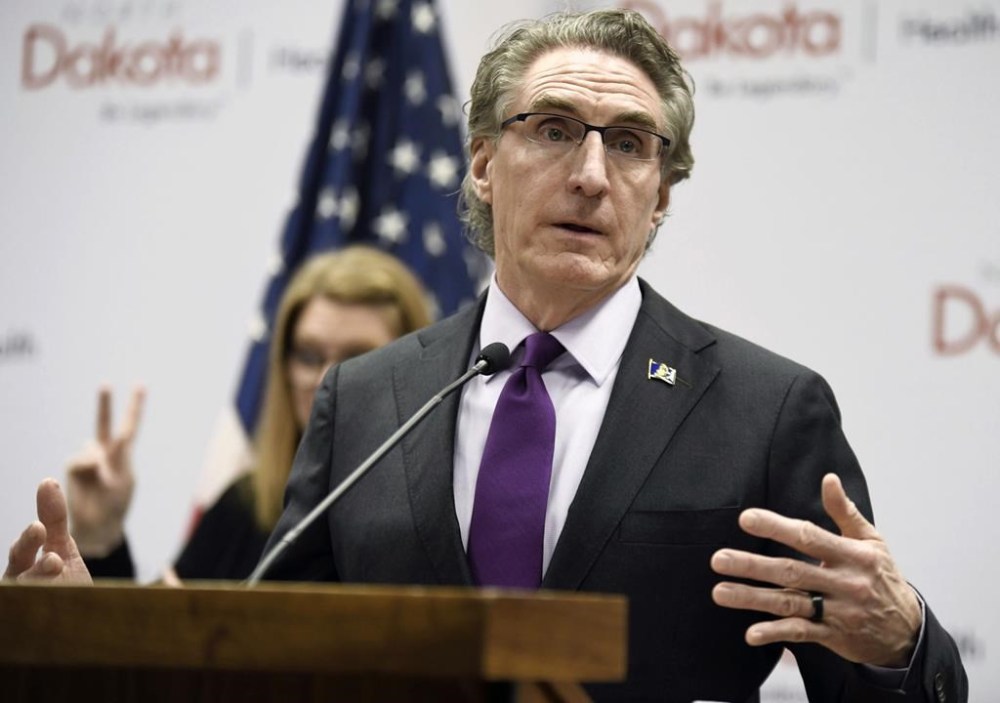North Dakota governor vetoes 1 library bill, signs another
Advertisement
Read this article for free:
or
Already have an account? Log in here »
To continue reading, please subscribe:
Monthly Digital Subscription
$0 for the first 4 weeks*
- Enjoy unlimited reading on winnipegfreepress.com
- Read the E-Edition, our digital replica newspaper
- Access News Break, our award-winning app
- Play interactive puzzles
*No charge for 4 weeks then price increases to the regular rate of $19.00 plus GST every four weeks. Offer available to new and qualified returning subscribers only. Cancel any time.
Monthly Digital Subscription
$4.75/week*
- Enjoy unlimited reading on winnipegfreepress.com
- Read the E-Edition, our digital replica newspaper
- Access News Break, our award-winning app
- Play interactive puzzles
*Billed as $19 plus GST every four weeks. Cancel any time.
To continue reading, please subscribe:
Add Free Press access to your Brandon Sun subscription for only an additional
$1 for the first 4 weeks*
*Your next subscription payment will increase by $1.00 and you will be charged $16.99 plus GST for four weeks. After four weeks, your payment will increase to $23.99 plus GST every four weeks.
Read unlimited articles for free today:
or
Already have an account? Log in here »
Hey there, time traveller!
This article was published 26/04/2023 (936 days ago), so information in it may no longer be current.
North Dakota’s governor vetoed a bill Wednesday that would have required librarians under threat of criminal penalty to screen sexually explicit materials from children, but signed another barring explicit materials from the children’s sections of local and school libraries.
The Senate voted 33-14 to override Republican Gov. Doug Burgum’s veto hours later, though a similar House vote would be needed to make a veto override successful. The House had passed the bill on a 54-38 vote last week, several votes shy of a veto-proof majority.
“Protecting children from explicit sexual material is common sense,” Burgum said in a statement explaining why he signed one of the bills into law.

But he said the bill he vetoed would have created “an enormous burden” on hundreds of public libraries by imposing — under the threat of criminal prosecution — an expensive requirement that libraries review materials that have already been screened for age appropriateness. His statement said it would cost the state $300,000 initially to conduct such screening and $150,000 per year thereafter.
“This bill is unnecessary, vague, and will not only cause immediate hardship to our schools and libraries, but also opens the door to costly, and unnecessary litigation,” library coordinator Misti Frink had said in testimony against the bill this month. “Robust checks and balances are already in place for print and digital resource selections.”
Republican Sen. Janne Myrdal, of Edinburg, spoke on the Senate floor in urging her colleagues to override the governor’s veto, saying exposure to sexually explicit material “is devastating for young people’s brains and lives.”
“We deal with millions of dollars here. $150,000 is like a drop in the bucket to protect our children,” Myrdal said.
Language in the vetoed bill said prosecutors could charge a person with a class B misdemeanor — up to 30 days in prison and $1,500 in fines — for willfully displaying sexually explicit material at newsstands or any other business establishment visited by minors. It said this would not include colleges, universities, museums or art galleries but would include public libraries and public school libraries, among some other places.
Opponents, including the American Civil Liberties Union of North Dakota, have said the now-vetoed bill would promote government censorship and violate First Amendment rights to say, think, read and write whatever one wants without fear of government retaliation.
Across the country, attempted book bans and restrictions on libraries have surged, setting a record in 2022, according to a recent report by the American Library Association.
Some books have been targeted by liberals citing racist language — notably Mark Twain’s “The Adventures of Huckleberry Finn” — according to Deborah Caldwell-Stone, who directs the ALA’s Office for Intellectual Freedom.
But the vast majority of complaints have come from conservatives, directed at works with LGBTQIA+ or racial themes, Caldwell-Stone has said.
Bills to restrict books have been proposed or passed in Arizona, Iowa, Texas, Missouri, Oklahoma, Florida and other states.
___
Trisha Ahmed is a corps member for the Associated Press/Report for America Statehouse News Initiative. Report for America is a nonprofit national service program that places journalists in local newsrooms to report on undercovered issues. Follow Trisha Ahmed on Twitter: @TrishaAhmed15


